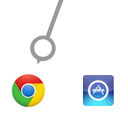Louis Gray now lives in Chrome: Is browser-only the future of software?
September 2nd, 2011 by jeremychone|
There is no doubt that Cloud-based applications is where the growth is, or that Google is currently the most advanced provider of horizontal productivity Cloud-based applications, and that for some users this is plenty enough. The bigger question is this: Are browser-only applications the future of applications? In other words, 20 years from now, will all applications live within a browser? Will Native applications be relegated to legacy applications? |
Personally, I do not think that one model needs to lose for the other to win.
I see the software industry evolution as a pendulum. Every couple of years, we switch focus back and forth between two competitive paradigms. In this particular case, we have moved between the ‘Native’ (a.k.a. desktop apps or Native apps) and ‘online’ (a.k.a. browser or Web or Cloud) application models. Each cycle made one of the two stronger and better than the last iteration, but neither became the ultimate choice.
For example, today, in the PC world, the pendulum is still on the Web side (trendily referred to as Cloud). However, on the mobile and tablet side, the pendulum is strongly anchored in the Native application for now. In fact, some of the Web’s unique characteristics, such as auto-update, were nicely ported over to the mobile Native world.
From a personal usage standpoint, I am exclusively using Gmail and Google calendar for my business and personal e-mail and calendaring needs, however I still use many desktop applications as well. I regularly use Camtasia for screen recording, After Effect for video editing, Photoshop for graphic design, and eclipse and xCode for development. Can they be ported to the Web? Yes, of course. Would they deliver the same experience? Probably not. Would it make sense to make a lightweight Web version of these apps? Yes, but it will not be the same target usage.
I would almost summarize it this way. For high-end content creation, like graphic design, video editing, or complex artifact creation, where invidual productivity is key, Native application is and will probably remain the better choice. For highly collaborative and online-centric applications the Web (I mean the Cloud) model is much more appropriate.
So, it should be “Web with Native” rather than “Web vs. Native.”
Do not get me wrong: I believe that, currently, the growth is on the Web/Cloud side. I manage my own development shop that specialize in building high-quality (i.e., Native-like) HTML5 applications for businesses. I am consistently pushing the boundaries of what we can do with HTML/5 (e.g., MathBoard for Google Chrome), and I am even in the process of writing a book about building Native like applications in HTML5.
So, I have no personal interest in defending the Native model against the Cloud/HTML5 one. However, as an independent passionate about software, I like to try to take the buzz away and focus on the bits, and for me, Web and Cloud should not be pitched as a universal hammer, nor should any paradigm or technology.
That said, I do think that we are currently in a perfect innovation storm: Between tablets, mobiles, html5, and cloud, the business opportunities are endless.
 Louis Gray wrote a nice post today
Louis Gray wrote a nice post today